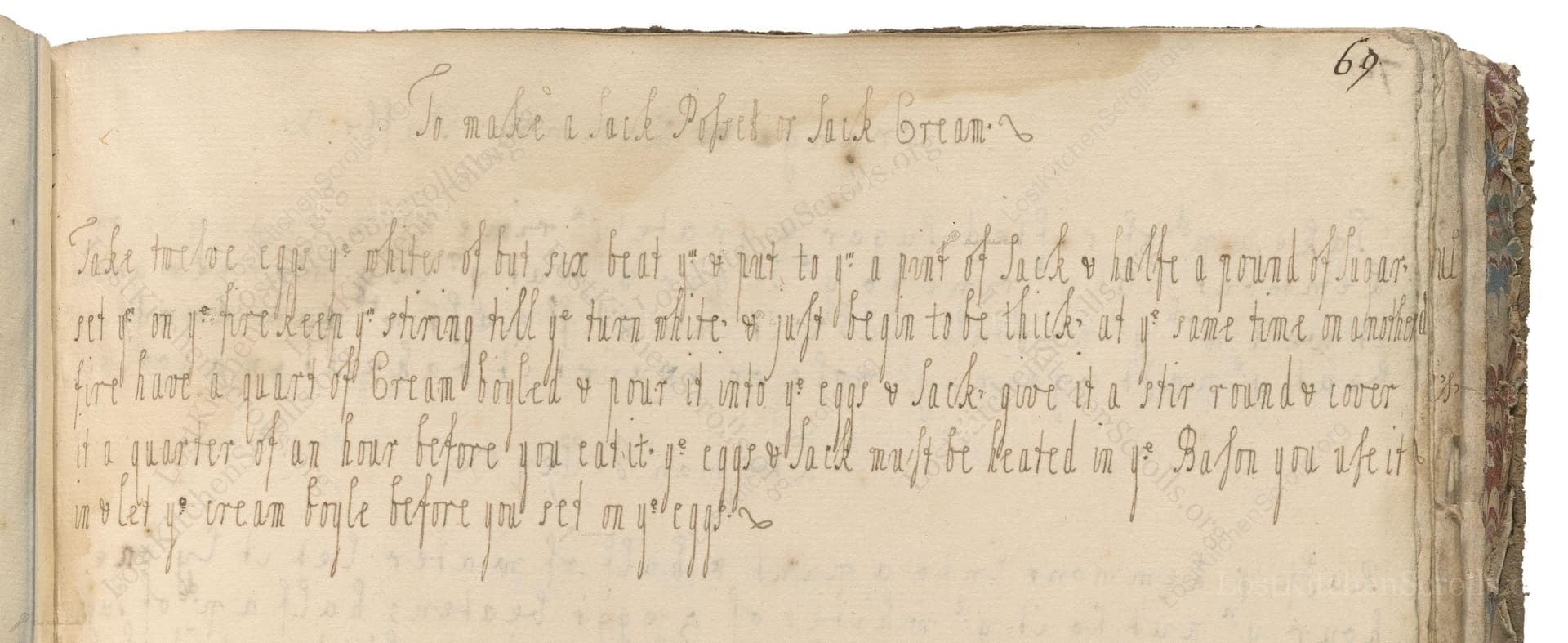To Make A Sack Posset Or Sack Cream
From the treasured pages of Cookbook of Mary Puleston
Written by Mary Puleston

To Make A Sack Posset Or Sack Cream
"Take twelve eggs ye whites of but six beat ye & put to ye a pint of Sack set it on ye fire keep ye stiring till ye turn white. & just begin to be thick at ye same time on another fire have a quart of Cream boyled & pour it into ye eggs & Sack give it a stir round & cover it a quarter of an hour before you eat it. ye eggs & Sack must be beated in ye Bason you use it in & let ye cream boyle before you set on ye eggs."
Note on the Original Text
The recipe, as was common in the 18th century, forgoes precise measurements and timing, relying on the experienced cook to judge texture and readiness by sight ('turn white & just begin to be thick'). Spelling is characteristically non-standard ('ye' for 'the', 'boyled' for 'boiled'), and directions follow a logical, conversational sequence rather than a strict list. The language is brisk and assumes a working familiarity with the customs and rhythms of the period’s kitchen.

Title
Cookbook of Mary Puleston (1764)
You can also click the book image above to peruse the original tome
Writer
Mary Puleston
Era
1764
Publisher
Unknown
Background
A tantalizing compilation of 18th-century culinary wisdom, this collection artfully preserves the flavors, techniques, and charms of British cookery before 1764—inviting modern gourmets to savor a taste of history with every recipe.
Kindly made available by
Folger Shakespeare Library
This rich and warming recipe for Sack Posset, also called Sack Cream, hails from the kitchen of Mary Puleston, who compiled it before 1764. Possets were a beloved treat in 17th and 18th century Britain—part comforting nightcap, part dessert, often thought to have restorative or medicinal powers. 'Sack' refers to a style of fortified white wine imported from Spain or the Canary Islands and was a luxury ingredient. At genteel tables, possets could serve as both celebratory toasts and fortifying winter warmers.

Traditional preparation would have relied on a large earthenware or pewter basin for beating the eggs and wine together, and a separate metal saucepan for boiling the cream. The bowl with the eggs would likely have been set over an open hearth or bed of coals to gently heat and thicken the mixture without scrambling. Ladles and wooden spoons were essential for stirring, and a simple cover (perhaps a pewter plate) helped the posset settle before serving in individual mugs or cups.
Prep Time
10 mins
Cook Time
20 mins
Servings
8
We've done our best to adapt this historical recipe for modern kitchens, but some details may still need refinement. We warmly welcome feedback from fellow cooks and culinary historians — your insights support the entire community!
Ingredients
- 12 large eggs (use only 6 of the whites)
- 2 cups (1 pint) dry sherry (substitute for 'sack')
- 1 quart (4 cups) heavy cream
Instructions
- To make a Sack Posset or Sack Cream in your modern kitchen, start by separating twelve large eggs, using only six of the whites.
- Beat all twelve yolks and the six whites together in a large mixing bowl until well-combined.
- Then, pour in 2 cups (1 pint) of dry sherry (a modern equivalent for sack) and mix well.
- Set this bowl over a gently simmering saucepan of water (a double boiler works nicely), stirring constantly until the mixture becomes pale, thickens slightly, and just turns opaque.
- Meanwhile, bring 1 quart (4 cups) of heavy cream to a boil in a separate saucepan.
- Once the cream is boiling, carefully pour it into the egg and sherry mixture, stirring gently to combine into a custard-like amalgam.
- Cover the bowl and let it sit for about 15 minutes to thicken and settle before serving warm, spooned into glasses or cups.
Estimated Calories
310 per serving
Cooking Estimates
It takes about 10 minutes to prepare the ingredients and get everything ready. Cooking the posset takes around 20 minutes. Each serving is about 310 calories if you divide it into 8 servings.
As noted above, we have made our best effort to translate and adapt this historical recipe for modern kitchens, taking into account ingredients nowadays, cooking techniques, measurements, and so on. However, historical recipes often contain assumptions that require interpretation.
We'd love for anyone to help improve these adaptations. Community contributions are highly welcome. If you have suggestions, corrections, or cooking tips based on your experience with this recipe, please share them below.
Join the Discussion
Rate This Recipe
Dietary Preference
Main Ingredients
Culinary Technique
Occasions

Den Bockfisch In Einer Fleisch Suppen Zu Kochen
This recipe hails from a German manuscript cookbook compiled in 1696, a time whe...

Die Grieß Nudlen Zumachen
This recipe comes from a rather mysterious manuscript cookbook, penned anonymous...

Ein Boudain
This recipe comes from an anonymous German-language manuscript cookbook from 169...

Ein Gesaltzen Citroni
This recipe, dating from 1696, comes from an extensive anonymous German cookbook...
Browse our complete collection of time-honored recipes



